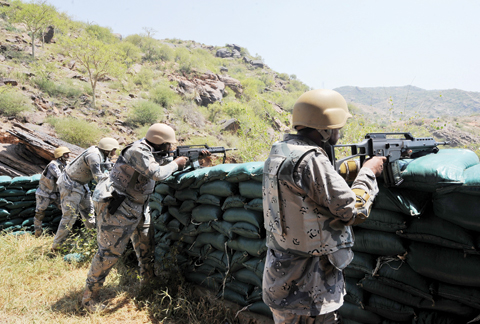
AL-KHUBAH, Saudi Arabia: Saudi border guards keep watch along the border with Yemen in this area in southern Jizan province on Oct 3, 2017. - AFP
AL KHUBAH , Saudi Arabia: Gas masks lie abandoned among rusting debris in a shell-pocked Saudi military outpost on the border with war-torn Yemen, an enduring flashpoint in more than two years of fighting against Houthi rebels. The post in Al Khubah, a deserted village framed by barren mountain ridges, is one of several border guard bases the rebels have targeted since a Saudi-led coalition began its military intervention in Yemen in 2015.
The Iran-backed insurgents' hit-and-run incursions and rocket barrages have not jeopardized Saudi control of the vast frontier, but they have underscored how the raging conflict in Yemen is spilling across the border, threatening scores of villages like Al Khubah. "The Houthis thought we will withdraw," Saudi border guard Colonel Mohammed al-Hameed said as he gave AFP a rare tour of the battered base. "But we are still very much in control," he added, broken glass and bullet casings crunching under his feet.
The base showed signs of close-range combat. The scorched walls were scarred with shrapnel and the metal ceiling was pitted with bullet and shell holes. A cat prowled behind a mountain of wrecked furniture. Gas masks had been procured for fear of potential chemical attacks, Al-Hameed said. He described the Saudi base on the edge of the frontier as an "arrowhead", directly exposed to Houthi mountain posts on the other side that give the rebels a strategic vantage point. The rebels, well-versed in the region's rugged topography, have mounted numerous cross-border raids in retaliation against Saudi airstrikes on their Yemeni strongholds.
Saudi Arabia led a 2015 intervention in Yemen to prop up the government of President Abedrabbo Mansour Hadi after Houthi rebels forced him into exile. But two years later, the kingdom appears to be in a quagmire. Hoping for a quick victory against what it saw as Iranian expansionism in its backyard, it has so far been unable to remove the Houthis from capital Sanaa. It has also been hit repeatedly by the rebels' cross-border incursions, raising fears the conflict could drag out yet further.
"It's been extraordinarily difficult to prevent Yemeni infiltrations across the border," Lori Boghardt, from the Washington Institute for Near East Policy, told AFP. "The Saudis are not just trying to protect civilians and... infrastructure from the tens of thousands of projectiles and ballistic missiles being launched over the border," she said. "There's also the broader strategic issue of trying to secure the basic territorial integrity of the kingdom."
The rebels have posted numerous propaganda videos purporting to show their incursions into Saudi territory, including one inside Al Khubah showing border guards beating a hasty retreat. "The Houthis are liars, liars, liars," Hameed said, claiming there had only been a handful of Saudi casualties and no fatalities in rebel assaults at the site.
Saudi Arabia does not officially disclose military fatalities, but state media has frequently featured funeral notices for "martyred" soldiers. Unofficial figures show that cross-border attacks by rebels have killed at least 140 soldiers and civilians in Saudi Arabia since March 2015. Given Saudi Arabia's large military presence along the border and its superior air power, the Houthis would struggle to hold any territory they might seize.
But their campaign of incursions represents a public relations win, experts say. "The definition of military success for the under-resourced Houthis is significantly different from that for the Saudis," said Adam Baron, a Yemen expert at the European Council on Foreign Relations. "Even if faced with high casualties, the Houthi breach into Saudi territory is a way to tell their supporters: 'Look, we are beating back the mighty enemy, we are invading their territory'."
Ordinary Saudi civilians have also been affected by the fighting. Thousands of residents have been evacuated from border towns across the southwest to create a buffer zone. In the frontier provinces of Jizan and Najran, thousands of mortar shells and crude rockets have slammed into schools, mosques and homes. But a constant refrain among border guards is that life remains normal. "City hall. Normal. Hospital. Normal. School. Normal," Hameed said as he drove past the sites en route to Al Khubah. "You are near the war but you will say 'where is the war?' We have successfully sealed the border."
But around a bend, the convoy entered what looked like a ghost town. Thousands of residents living in border communities have been moved to safer ground. Crashing mortar shells have left large craters in the ground. "Houthis are a cancer," Hameed said. "If you have power, target us. Why kill civilians, women and children?"
Saudi Arabia has faced repeated accusations of targeting civilians in Yemen. But for border guards, the threat emanating from Yemen is existential. Hameed ducked slightly as he got out of his armored vehicle, for fear of Houthi snipers and fighters lurking in the hills. He described the area as a "kill zone". But, he added, "as you can see, we are in full control here". - AFP




